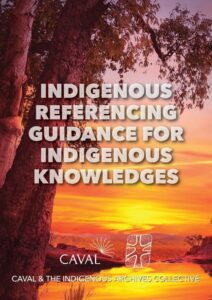Acknowledging cultural authority and Indigenous Knowledges in referencing
19 February 2024
A presentation at a CAVAL event on ‘Indigenous Elders as researchers, Indigenous Knowledges and the library’ in November 2018 sparked an overdue but meaningful conversation around the question: How are Indigenous Knowledges acknowledged in current citation practices, and how do library staff engage with and teach people about it?
To explore this, the CAVAL Acknowledging Cultural Authority and Indigenous Knowledges in referencing (CACIK) working group was created in early 2020 as a subgroup of the CAVAL Research and Information Group (CRIG).
The original aim was to consider how we, as library staff, can further the conversation about communicating and acknowledging Indigenous Knowledges. To enhance their efforts, the group was keen to produce guidelines to assist students with referencing queries on how to cite Indigenous Knowledges in their academic work.
The project’s first step included a comprehensive environmental scan to identify existing Indigenous Knowledges citation guidelines in use in Australia and abroad so as to avoid redundancies. While several citation style guides now include a level of guidance on citing Indigenous Knowledges, as well as citation work undertaken by Nathan Sentence, there were no guidelines for a Victorian context.
The CACIK was mindful that First Nations Peoples needed to be consulted and included throughout the project. Therefore, CAVAL and CACIK reached out to local Indigenous academics, Indigenous institutes, and Indigenous people working in the GLAMR (Galleries, Libraries, Archives, Museums, and Records) sector to seek advice as to where this project could start. After consultation, CAVAL approved funding for furthering the project and in 2022 opened a tender for interested organisations to assist CAVAL in producing an Indigenous Knowledges Toolkit.
Through the tender request, CACIK connected with the Indigenous Archives Collective (IAC) which joined CAVAL as a consultation partner to co-create the foundations of a living guiding principles document regarding citation practices, and issues that may arise when referencing Indigenous Knowledges within the Aboriginal lands that make up the state of Victoria, Australia.
The Indigenous Referencing Guidance for Indigenous Knowledges was launched on 24th May 2023 to CAVAL’s members and the wider library and information community. The document consists of two parts, an Indigenous Knowledges Attribution Toolkit (IKAT) and a Citation Style Guide – the combined document commonly referred to as ‘the Toolkit’. The feedback from the community has generally been positive and has indicated areas where the Toolkit can be extended in the future. The Toolkit is available to download here.
Since the launch of this Toolkit, CAVAL has contributed to the development of the Guidelines for First Nations collection description and gathered the library and information community to discuss how we can describe, apply, and amplify Aboriginal and Torres Strait Islander publications at the Kummargii Yulendji (Knowledge Rising) symposium with Informit.
For CAVAL, 2024 will see the continuation of conversations around how to respectfully recognise and highlight Indigenous Knowledges, especially in the areas of reparative description and amplification of First Nations research and publications.
If you would like to provide feedback or contact us regarding the Indigenous Knowledge Attribution Toolkit at any stage, please email [email protected].

Contributed by Sae Ra, Acting CEO, CAVAL